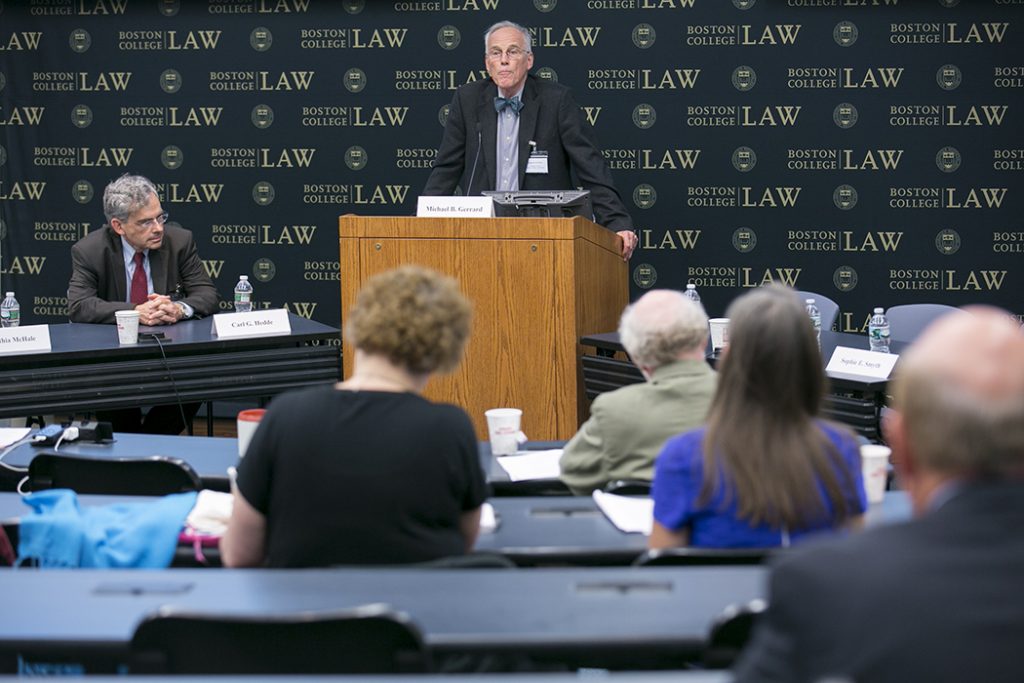A conference on insurance law and climate change—an unusual but eminently sensible, even critical, pairing for the planet’s well-being—attracted presenters from locations as far flung as Baton Rouge, Los Angeles, and Jerusalem. They offered ideas on a wide assortment of climate-and-insurance-related matters: how municipal liability insurance can better reinforce the regulation of real estate developers; whether business insurance should cover crop losses caused by drought; whether coastal residents should be encouraged, with a nudge from their insurers, to move to higher ground.
Convened a month before 150 world leaders gathered in Paris for the historic UN Climate Conference, BC Law’s event was a portentous occasion. For one thing, the BC Law School conference brought together some of the best minds in the industry, who zeroed in on a climate-related question that hasn’t received much public notice but will likely affect every consumer, homeowner, and business on the planet: How can a 20th century insurance industry handle the 21st century’s natural catastrophes with their soaring costs and the political, economic, legal, and social rivalries they are likely to engender?
For another, the conference advanced the Law School’s leadership in insurance law, policy, and scholarship, the result of the establishment several years ago of a Liberty Mutual professorship and writing prize that envisioned BC Law as a player in the insurance arena. Patricia McCoy, who became the inaugural Liberty Mutual Insurance Professor in 2014, was one of the conference organizers, along with environmental law professors Zygmunt Plater and David Wirth and staffers from the Boston College Environmental Affairs Law Review, which will publish the conference papers. (On January 22, BC Law School is co-sponsoring, with the American College of Coverage and Extracontractual Counsel, another insurance conference, “The New Face of Insurance Litigation.”)
The speakers offered two main messages.
First, climate change has been reshaping the insurance business, with traditional insurers increasingly unwilling to bear the risk of climate-related catastrophes. Almost fifty years ago, insurers fled the residential flood insurance market, to be replaced in 1968 by the National Flood Insurance Program, an arm of the federal government. Since Hurricanes Andrew and Katrina, more and more insurers have also refused to cover wind damage to coastal properties. Once again, government has stepped in, this time by forming high-risk insurance vehicles such as North Carolina’s Coastal Wind Pool, a public-private partnership. Donald Hornstein, a board member of the wind pool and University of North Carolina professor, reported that the risk is borne by private insurers (who have to join the pool if they want to do business in the state), as well as reinsurers, taxpayers, and investors in so-called catastrophe bonds, which can pay interest of close to 10 percent in years of low insurance claims.
The other big takeaway from the conference: Through careful rewriting of policy language, insurers can incentivize policyholders to adapt to climate change—or help reduce it. Professor Chad Marzen of Florida State University, for instance, suggested revisions to federal crop insurance that would encourage techniques, such as growing cover crops, that reduce atmospheric carbon dioxide by storing carbon in the soil.
Professor Sean Hecht, of UCLA, described a recent attempt, supported by both libertarians and environmental groups, to discourage settlement in flood-prone locations by pricing flood insurance to actuarial risk, such that “buildings at a certain elevation would have dramatically, dramatically high premiums”—too high for many people to pay. The change was embodied in a 2012 law that provoked a major backlash and was largely undone by a subsequent law. One possible alternative: Price premiums to risk, but offer discounts to homeowners who take measures to protect their houses from floods, such as raising them on stilts.
Working a similar vein, LSU law professor Edward Richards, in what he called “a thought experiment,” asked attendees to consider replacing the existing flood insurance program with a product whose premiums rise substantially each year, as with life insurance policies, until insurance costs are so high that it pays to move to higher ground, especially if the new insurance is coupled with a government buyout program for vulnerable coastal properties.
Other presenters at the conference included Cynthia McHale, director of the Ceres Insurance Program; Qihao He, University of Connecticut; Christopher Serkin, Vanderbilt University; Itzchak Kornfeld, Hebrew University of Jerusalem; Anastasia Telesetsky, University of Idaho; Michael Bennett, the World Bank; Sophie Smyth, Temple University; and Carl Hedde, Munich Re. The lunch speaker was Patrick Parenteau, Vermont Law School, and the keynote address was delivered by Michael Gerrard, Columbia University.


